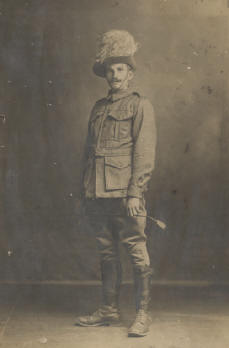Nicholas Tupicoff
| Russian spelling | Николай Васильевич Тупиков |
|---|---|
| Born | 22.07.1893 |
| Place | Perekopnoe, Samara, Russia |
| Ethnic origin | Russian |
| Religion | Russian Orthodox |
| Father | Vasily Tupicoff |
| Mother | Tatiana Timofeevna |
| Family | Family wife Alexandra Tupicoff (née Muller), married 1919, children Richard Nicholas b. 1920, Lenard b. 1922 (served in WWII), Frank b. 1924, Douglas b. 1926, Joan b. 1928, Olga b. 1930 |
| Contacts | Brother Alexis Tupikoff |
| Residence before arrival at Australia | Lived in Manchuria for 12 years, studied at Commercial High School, worked as Chinese interpreter, could speak Chinese, Russian, German, Polish and English. |
| Arrived at Australia |
from Japan on 10.11.1912 per Yawata Maru disembarked at Brisbane |
| Residence before enlistment | Queensland, Rockhampton |
| Occupation | 1912 clerk; 1915-16 labourer, 1921 farmer, 1925 striker, 1930 boiler maker's assistant, 1930 labourer, 1949 railway employee |
| Naturalisation | 1922 |
| Residence after the war | Ipswich, Coominya, Ipswich, Townsville, Ipswich, Qld |
| Died | 30.11.1976, Qld |
Service #1 – Depot
| Service number | 2513 |
|---|---|
| Enlisted | 14.12.1915 |
| Place of enlistment | Rockhampton, Qld |
| Rank | Private |
| Discharged | 6.03.1916 MU |
Service #2
| Service number | 2513 |
|---|---|
| Enlisted | 22.06.1916 |
| Place of enlistment | Brisbane |
| Unit | 47th Battalion, 49th Battalion |
| Rank | Private |
| Place | Western Front, 1917-1918 |
| Casualties | WIA 1918 |
| Final fate | RTA 9.12.1918 |
| Discharged | 25.03.1919 |
Materials
Digitised naturalisation (NAA)
Digitised service records (NAA)
Digitised Embarkation roll entry (AWM)
Alien registration (NAA)
Wife's alien registration (NAA)
Repatriation Medical case file (NAA)
Alexandra Tupicoff, A family history, 1985 - Alan Tupicoff's archives, Brisbane
Nicholas Tupicoff [by his children] - Alan Tupicoff's archives, Brisbane
Blog article
Newspaper articles
Charge of murder. The Dakabin tragedy. Russian before the court. - The Brisbane Courier, 10 September 1914, p. 9.
Charge of murder. The Dakabin tragedy. Further evidence. - The Brisbane Courier, 12 September 1914, p. 11.
Charge of wilful murder. The Dakabin tragedy. Defendant committed for trial. - The Brisbane Courier, 17 September 1914, p. 3.
Charge of murder. The Dakabin tragedy. - The Brisbane Courier, 7 October 1914, p. 4.
The Dakabin tragedy. Tupicoff discharged. - The Brisbane Courier, 8 October 1914, p. 8.
Murder charge fails. - The Sydney Morning Herald, 9 October 1914, p. 4.
Makovetsky mystery. - Truth, Brisbane, 11 October 1914, p. 2.
Death of a soldier. - Telegraph, Brisbane, 14 April 1916, p. 3.
Soldiers' meeting. - Queensland Times, Ipswich, 30 August 1941, p. 2.
From Russian Anzacs in Australian History:
Some family members met up in Australia, later enlisting together in the AIF -- like the Tupicoff brothers, Nicholas (whom we encountered earlier on the trans-Siberian, escaping conscription) and Alexis. Nicholas had been brought up by his well-to-do stepfather in Harbin, and had already begun work there as a Chinese interpreter with an American company: 'He could speak Chinese, Russian, German, Polish and English. He worked, lived, and dressed as a Chinaman ...'. Arriving in Brisbane in 1912, Nicholas found work labouring on the railways and also, using his languages, as a shipping clerk meeting the boats in Brisbane. 'He did not like the work on the railway line and decided to go back to Russia. He came down to Brisbane to send a letter to Alec [his brother Alexis] and went to meet a boat and found Alec on that boat.' So, instead of returning to Russia, where both their parents were now dead, the brothers remained together, finding rural work in Queensland until they enlisted.
[...] The only way some Russians, especially those with families, could survive was by supplementing their wages with back-yard 'farming' and Nicholas Tupicoff's story, as told by his family, is a good example of this. After the Tupicoff brothers walked off their blocks at Coominya soldiers' settlement, Alexis moved to the Atherton Tablelands and worked in the timber industry there. Meanwhile, in 1919, Nicholas had married Alexandra Muller, who was from a Russian German family that had migrated to Australia before the war; by 1930 they had six children. Alexandra had two years of schooling in Australia, as she relates in the family history: 'I left school when I was 14. There was nothing else I could do, so I did domestic work. This hurt Father, that a daughter of his had to be a servant when he had always had servants working for him.' Nicholas, on the other hand, 'was educated but he spent most of his life as a blacksmith striker; that was the only job he could get'. They settled in Ipswich (Queensland), where Nicholas went back to working in railway workshops, and in 1932 bought a house in Hopetoun Street. [...]
Gallery

Nicholas Tupicoff
Courtesy of Dennis Tupicoff
 Russian Anzacs
Russian Anzacs